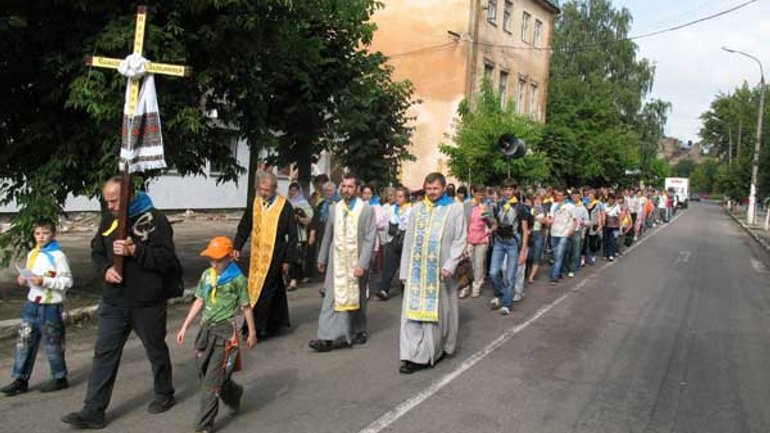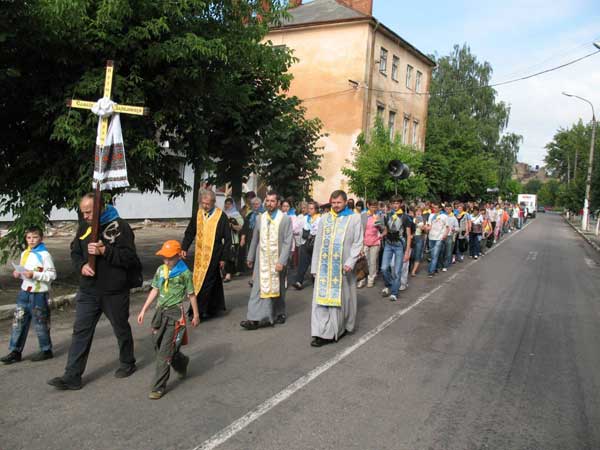Father Vasyl Potochniak: Migration has left its mark on each of us

Saturday, October 30, from St. George’s Cathedral in Lviv, a night pilgrimage will begin to Stradcha for Ukrainian migrants and their families.
To learn about the main mission of the pilgrimage of the migrant families that is taking place for the first time in Lviv, its main goals, as well as about the new challenges of migration and how the Ukrainian Greek Catholic Church reacts to them, we spoke with its organizer Father Vasyl Potochniak, the executive secretary of the Pastoral and Missionary Division of the UGCC, a priest who has a lot of personal experience ministering for Ukrainian migrants abroad.
— Father, what is the key idea of the first meeting of migrants and their families in Lviv? What is the main emphasis?
— We organize this even, above all, so that all kinds of people who are affected by migration can meet, listen to one another. On the other hand, with these events, we want to bring attention of the Ukrainian community to the fact that we all live in an invisible field of the consequences and reasons of migration and that those who went abroad to work need spiritual guidance and adaption, as do those who stayed. Therefore, the main emphasis of the planned meeting is to help all who are affected by migration.
Our meeting with the families of the migrants will end with a spiritual element – a pilgrimage to Stradcha – during which we can pray, think about our troubles and problems, and this will conclude with our addresses to God, from whom we will ask for forgiveness and help.
— Do such events have a continuation in time and space? In what form?
— Each meeting draws people together and with our presence and attention to one another we show that a problem of a certain person is not just his or her problem. Always during such pilgrimages we exchange contact information for further support. For example, in Ivano-Frankivsk a community of former workers called Pieta was created, where every week families of migrants and returnees meet. Maybe something similar will be created in Lviv.
— Do you foresee any special spiritual moments during this pilgrimage? And why is it to be held at night?
— This time one of the important spiritual moments will be our prayer in the village of Riasne, which will take place around midnight, near the grave of Father Zarytskyi, who was a missionary in Kazakhstan and established the foundations of the Greek Catholic Church among our compatriots. Near his grave we remember our spirituality, which shaped our spiritual Ukraine abroad.
In addition, our work in groups, where we will have a chance to discuss various topics, especially, the role of the church in family life, will be very important.
In regards to your question about the night aspect, it is above all a spiritual tradition. From experience of the last five years, when we go one our ten-day pilgrimage from Sambir to Zarvanytsia, we know that during the day we have a lot of temptations: people look at us as we go, and sometimes it seems that we look like Pharisees; there are a lot of distractions during the day. And thus we decided to go at night, at a time when all temptations have vanished – transportation runs less often, no one looks at how you look or prayer. A night pilgrimage is a better way to concentrate on spiritual communication with the Lord. A night pilgrimage also includes a practical aspect: at night people are not hurrying to get home and can calmly socialize with one another.
— Who are you inviting to the pilgrimage? Only migrants? How can migrants and their families take part in the pilgrimage in a practical way? To whom should they turn and when? What is the program of the meeting and the pilgrimage?
— We invite all who want to be with us. Ukrainians have been well acquainted with migration for many generations and it has left its mark on each of us. Registration is not required thus anyone can join us at any time during the pilgrimage. According to the program, on Saturday, October 30, in the conference hall on the left side in front of St. George’s Cathedral, from 4 p.m. to 7 p.m. a meeting will take place for the migrants, their families, and all interested persons. The theme of the meeting will be “Pastoral Care of a Migrant Family.” At 8:30 p.m. we will pray in the cathedral and receive a hierarchal blessing for the night pilgrimage to Stradcha. At 9 p.m. we will depart from the cathedral, via Riasne. The Holy Liturgy for the workers will begin at 6 a.m. in Stradcha, later the Road of the Cross.
— Are you expecting only Greek Catholics?
— No, since we are involved with migration, we believe that when people suffer from it, and even when they are not believers, we should help them and pray for them.
— Father Vasyl, I know that you have a lot of experience in ministering migrants in Italy. From your observations, what are the new challenges of migrants today?
— I think that this challenge is assimilation of Ukrainians with the peoples, among whom they live. If ten years ago people went away for half a year to a year, later for three years, then now they go for longer periods, often taking along with them their children, and usually do not continue speaking their language or attending their church. Abroad we already have Ukrainian children who don’t speak Ukrainian, don’t attend our church, and this is one of the main challenges of migration, in my opinion. There are others; for example, disappointment. Ukrainians have gotten used to the role of the observer, only complaining, but don’t think it necessary for them go to the polling stations, and as such nothing will change. But here, I think, the church should help people, make them understand that their future is only formed by them, that only they are responsible for it. And living in constant disappointment is not worthy.
— What are the reasons for the assimilation you have mentioned?
— There is no straight answer to this question. But we see that migration today is above all an economic phenomenon. Thus many people today do not insist on preserving their identity and faith. Earlier migrations of Ukrainians to other countries included patriotism. Another negative factor of working abroad is globalization, in which the national identity and faith dissolve.
We need to talk about the expansion of UGCC’s mission due to the new challenges of migration; in particular, about transferring the emphasis from a geographical to an anthropological dimension of anxiety for a person, as His Beatitude Lubomyr (Husar) highlights in his address to the Synod of Bishops of the Catholic Church…
I believe that that the Ukrainian church abroad should remain as an island not only of spiritual identity, but of national identity. At the church there should be a Sunday school, a choir, regular youth meetings, cultural and educational events, etc. That which the Ukrainian state does not do today, should be done by the church. His Beatitude Lubomyr stresses that our church should give spiritual guardianship to each Greek Catholic that resides in any corner of the world.
— And what about the changes in the philosophy of preparing pastors who have to fulfill not only the task of a priest in serving abroad, but also have to be ready to help people with social, legal, and countless other problems? Often Ukrainians go to the priest when they no longer believe in anyone else…
— We have shortcomings in such preparation, but only from a lack of experience. But, I can also talk about positive improvements that we have observed in the last several years. First, this year we introduced in every Greek Catholic seminary two required courses—general missiology and missiology of the Greek Catholic Church. We plan for seminarians to have meetings with missionaries – priests, nuns, laity – who will share their positive experiences in saving human souls.
Second, we are starting to prepare these fathers and monks, as well as laity who offer to devote themselves to our faithful, for pastoral work.
Third, we want to meet with these pastors who serve abroad and visit Ukraine during vacation at least once a year. For this we are planning to organize a yearly meeting in Kyiv, where there will be an opportunity to listen to their suggestions, requests, to share with them the experiences we received from the problems of migrants here. In addition, we are also searching for new ways to prepare pastors because we understand just how important this is as a consequence of the new social and migration challenges that we have today.
— Thank you for the interview!
Interview by Svitlana Odynets
October 2010









